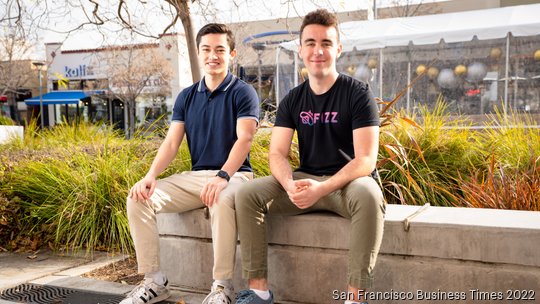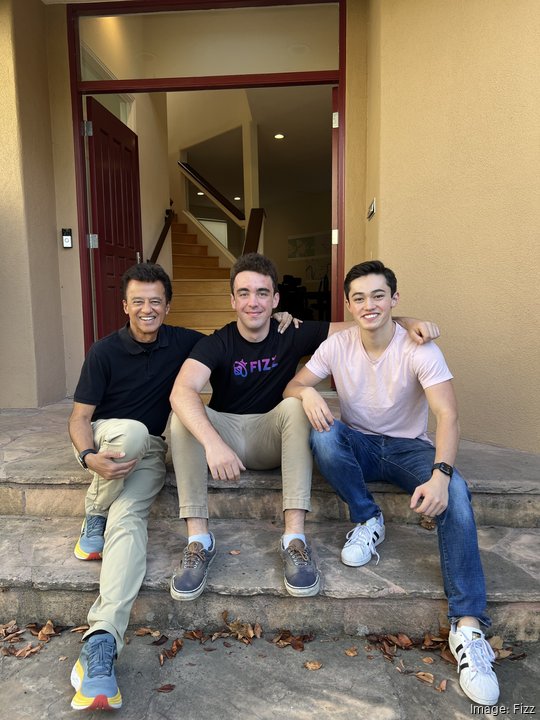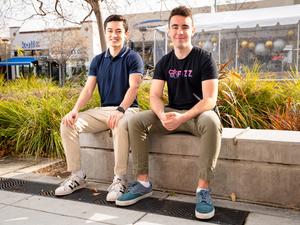
A social media startup based in Palo Alto has raised $25 million in fresh funding as it works on fueling its growth at colleges and universities across the country.
Legally known as Fizz Social, the company announced the Series B round on Thursday, bringing its total funding to just over $41 million. Owl Ventures led the round, and NEA also participated. The company declined to confirm its valuation.
COO Teddy Solomon and CTO Ashton Cofer co-founded Fizz in 2021 when they were attending Stanford University. Rakesh Mathur quickly joined the team as its chief executive after initially investing $750,000 into the company, TechCrunch reported last year.
The social media landscape has been changing over the past few years. TikTok's explosive growth in the U.S. has challenged Meta's long-held dominance. And Twitter, now X Corp., has hemorrhaged advertisers and users since Elon Musk took the company private in late 2022.
Fizz is attempting to capture a slice of the attention economy, and as Generation Zers, its founders say they know what college students want.
"It's about community. It's about intimacy. It's about authenticity," Solomon told me. "What Gen Z wants is, they want to feel better after going onto a social media platform. They want to have gone on and found out where the parties are. They want to go on and have seen a joke about something that they just saw on campus five minutes ago. It's about things being current and relevant to them."
The company declined to disclose its daily or monthly users but said the app is active at more than 80 college campuses across the country, and Solomon told me that they are aiming to add a couple hundred more campuses this year — a bit shy of their goal to reach 1,000 campuses by the end of 2023, which TechCrunch reported in October.
Within five years, the company wants to be active at all colleges, Solomon told me.

Their strategy has been cultivating buzz one college campus at a time, one donut at a time until there's enough momentum to fuel FOMO, a.k.a., the fear of missing out, through word of mouth.
"My background is originally in journalism, where I thought that everything is based on storytelling and telling the story in some sort of compelling way. So, we've embraced that in the way that we market," Solomon said. "It's very low touch. It's one a day, and it's about planting the seed on the campus, so people know why we're there. And once they know why we're there, and once they get their experience on the platform, they're there to stay."
That approach has led to Fizz reaching 50% adoption rates among students within two months of launching at a campus, the company claims, and an even higher rate of 95% adoption at some schools like Stanford and Pepperdine.
Fizz also says that it uses both human moderators and artificial intelligence services from third-party providers for content moderation. The AI component accounts for around a quarter to half of the company's content moderation, Mathur said.
The app also uses a Reddit-style form of community voting, and users can only sign up with a valid college or university .edu email.
"Since our Series A, something that we've changed about our moderation system is it is a democratic voting process now. So no one moderator can remove any posts within the community," Solomon said, "and these are moderators who are trained by our team. They're moderators who know what posts are bullying, doxing, offensive content, overly obscene content. And we've stuck with this model of decentralized human moderation, tied up with AI."
Could Fizz — which was also selected as one of Bay Area Inno's 2023 Startups to Watch — eventually break out of the college market and expand into a mainstream app? That would follow Facebook's path — the company started as a site for Harvard students before breaking out more broadly.
"I think in five years, we, more than any other social media app, will be the Gen Z social media. It's not going to be anything else," Mathur told me.
Other social media companies are attempting to capture market share with college students, as well. They include New York-based Flower Ave, which owns Sidechat and YikYak, Palo Alto-based ZeeMee and Philadelphia-based FuzeMee.
San Francisco-based social media app IRL was broadly going after the Gen Z market, as well, but shut down in June after its board of directors discovered that 95% of the startup's users were fake. IRL's founders had raised nearly $200 million, and was valued at almost $1.2 billion after SoftBank led its Series C round in 2021.
SoftBank is now suing IRL's former CEO Abraham Shafi, and several others, for alleged fraud.





